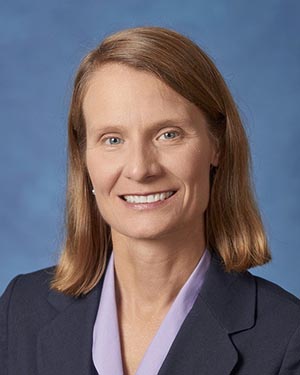Cunningham appointed to board overseeing Nation's Report Card
1/30/2020
U.S. Secretary of Education Betsy DeVos has appointed Christine Cunningham, professor of practice in education and engineering at Penn State, along with two others to three-year terms on the National Assessment Governing Board, which oversees the only continuing, nationally representative evaluation of U.S. students’ knowledge.
DeVos named former Mississippi Gov. Haley Barbour, one of the new appointees, as chair of the board. The third appointee is Patrick Kelly, a 12th-grade teacher for Richland School District 2 outside of Columbia, South Carolina.
The Governing Board is a nonpartisan body that works independently from the U.S. Department of Education to set policy for the National Assessment of Educational Progress (NAEP), also known as The Nation’s Report Card. NAEP provides objective information on student performance in various subjects and allows comparisons of student achievement among states, large urban districts, and various student groups.
The 26-member governing board is responsible for deciding which subjects NAEP assesses; determining the assessments’ content; setting achievement levels that describe student performance; and pursuing new ways to make NAEP results meaningful to the public.
“I am pleased to welcome these new members to the National Assessment Governing Board,” DeVos said. “Their richly diverse backgrounds will help the board as it continues its critical work to inform students, parents, educators and policymakers about the state of American education. The latest Nation’s Report Card shows a student achievement crisis, especially in reading, and I’m eager to see how the board continues to tackle that critical challenge,” she said.
“It’s a great honor to have been selected to serve my country on the NAGB,” said Cunningham. “My work focuses on creating more equitable, accessible and inclusive educational materials and environments for use nationwide. This work has helped me to understand how wonderfully diverse our nation’s schools and students are. I will bring this perspective to conversations that guide our national assessments such as NAEP that can help distill a national, longitudinal view of students’ knowledge and experiences.”
Cunningham’s work with schools has also demonstrated the role that assessments play in shaping school policies and classroom instruction. She said NAEP is unique because it collects data from students in every state and 22 cities to understand how we as a country are doing and to inform how we might improve. As such, she said it permits state-level analysis and exploration of contextual variables.
“Participation in such boards also offers me a wonderful opportunity to learn from other talented individuals with a range of perspectives that spark new ideas, ways of thinking, or collaborations. I am looking forward to participating as a member of the National Governing Board and making a national contribution to our educational system and country,” Cunningham said.
In addition to her role at Penn State, Cunningham is founder of the Engineering is Elementary Program at the Museum of Science in Boston. She won the Harold W. McGraw Jr. Prize in Education in 2017 for pioneering curriculum that introduces engineering concepts and practices at the elementary level.
The governing board appointees announced today (Jan. 30) are the final three board members to be appointed for the 2019-2023 term. Their terms officially began on Oct. 1, 2019 and will end on Sept. 30, 2023.
In addition to Cunningham, the newly appointed governing board members and the roles they represent on the board are:
- Haley Barbour, board chair and general public representative. Barbour was governor of Mississippi from 2004 to 2012, where he focused on education reform and improving student outcomes. Previously, Barbour had served in the White House under President Ronald Reagan and as chairman of the Republican Governors Association from 2009 to 2011. Barbour returned to BGR Group, the government affairs firm he founded, after leaving the governor’s office. His term as chair of the board will start immediately.
- Patrick Kelly, 12th-grade teacher. Kelly works in a hybrid role teaching AP U.S. government and politics and serving as coordinator of professional learning for Richland School District 2 outside of Columbia, S.C. Kelly is certified by the National Board for Professional Teaching Standards and was a finalist for the South Carolina State Teacher of the Year award in 2014. He also has served as a teaching ambassador fellow and lead classroom teaching ambassador fellow for the U.S. Department of Education.
“We are thrilled to welcome these three outstanding new members to the board,” said Lesley Muldoon, executive director of the National Assessment Governing Board. “They join an esteemed group of leaders from across the country who ensure the Nation’s Report Card serves as a resource for improving educational outcomes for all American students.”
The National Assessment Governing Board is an independent, nonpartisan board whose members include governors, state legislators, local and state school officials, educators, business representatives and members of the general public. Congress created the 26-member governing board in 1988 to set policy for the National Assessment of Educational Progress. For more information, visit www.nagb.gov.




